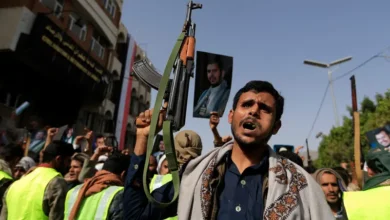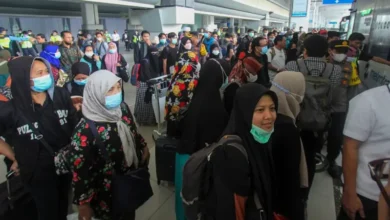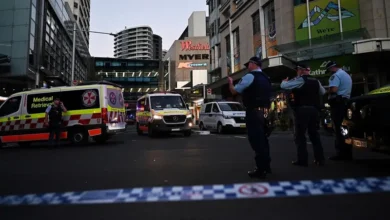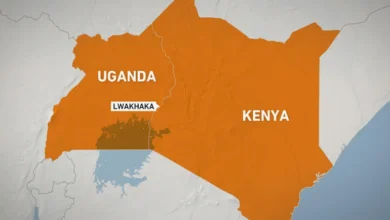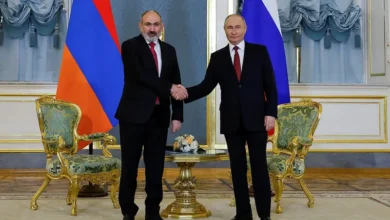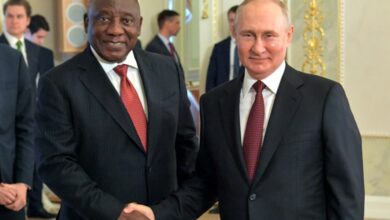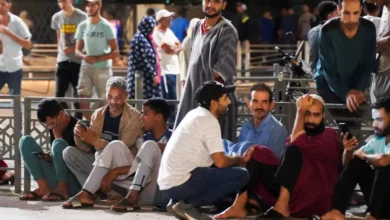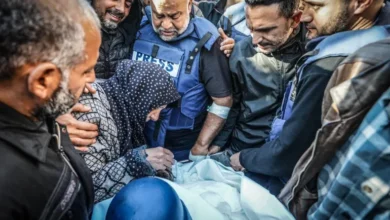Finally free, Ubai was among the last Palestinian detainees Israel released

On his first morning of freedom after being released from Israeli prison, Ubai Youssef Abu Maria wandered around his home, checking in on his parents, as if to make sure everyone was there.
They had all gotten home at dawn that day, Friday, and while his body was tired, he was so happy to be home that he only managed two hours of sleep before he went to his parents’ room and woke them up.
Only half-joking, he asked his mother Fidaa, 38, to make him a breakfast he had been dreaming of since October 7 – qalayet banadora, a spicy skillet of fresh tomatoes simmered with hot Palestinian chilli peppers. It was served with the requisite fruity olive oil, special family-recipe zaatar and a cup of sweet tea.
As he ate, Ubai told his mother that he had eaten nothing that tasted anything but awful over the past two months. He missed being home and being taken care of.
Then, he headed out to the barber’s to trim his “wild” hair that had not been tended to for two months, returning groomed and feeling a bit more normal.
‘I saw the happiness in my father’s eyes’
Ubai Youssef Abu Maria is 18, lives north of Hebron and has already been arrested six times by Israeli forces. Sometimes he was held for days, sometimes for hours. The first time, he was 14 years old and was held for 15 days.
A year later, when he was only 15, he was arrested again and held for nine months. The last time he was taken was on October 8 and told he would be in administrative detention, a near-informal status that ostensibly lasts six months but is often renewed over and over with the detained person never being charged or tried.
Each time, his parents watched and waited, worrying about their son.
Then a “humanitarian pause” was declared between Israel and Hamas this month, with an exchange of captives for prisoners as part of the deal – hope reared its head and Ubai’s parents Fidaa and Youssef started to get ready, in case Ubai was released.
He eventually was, in the seventh and last batch of Palestinian prisoners released from Israeli detention on Thursday.
“I saw the happiness in my father’s eyes,” Ubai said. “For us, we’re friends more than father and son, and I look up to him as a role model.
“He was worried for me in detention, especially because of my injured arm.”
Ubai had been shot in the elbow by Israeli forces last November, losing 70 percent use of his arm as a result. He had been undergoing post-surgical treatment, but his arrest just one month after the platinum pins were removed from his elbow cut that short.
“I told the Israelis over and over that my arm was injured. They didn’t care, in fact, it seemed to amuse them to shackle my hands anyway,” Ubai said.
“Even the prison doctor laughed at me when I asked for medicine. Made me think that this guy is a jailer in a doctor’s coat. They only gave me Acamol [paracetamol] once. That was it.
“I’m happy that I can continue my treatment now. I’m home, and I can see my family and be with them. There are no words to describe this joy.”
First words, first embraces
When Ubai walked into the house at dawn on Friday, Fidaa was taken aback at first.
“I kept looking at him, found myself backing away and thinking in disbelief: ‘That’s not my boy.’ He looked so different, not the healthy boy he was, he had lost so much weight, looked so exhausted, skin and bones with big messy hair on top.
“I cried, with joy I guess, I don’t know. My first words to him were ‘How’s your arm? Move it, show me how it is.’”
Ubai’s first words to his mother were sweeter, as he hugged her, told her he missed her and called her “My Life”, an Arabic term of endearment he uses for her.
Shortly after that, he had to show her that his arm was still mobile, of course. As for his father, he had greeted him with “My Crown”, which is a cross between a term of endearment and “boss”.
After a breakfast fit for a king and a trip to the barber, Ubai’s house filled up with family and friends coming to see him and welcome him home. So many that he wasn’t able to get his favourite meal at lunchtime, stuffed zucchini in a yoghurt sauce, and had to be satisfied with a promise that he’d be able to have it on Saturday.
Reunions with loved ones were more than enough to make up for any culinary disappointments though, and Ubai spoke to Al Jazeera fondly about seeing his childhood friend, Mahdi Hammad, when he got off the prison transport vehicle that brought him from Ofer Prison to Ramallah. “He took me to my father and family, they had already been waiting for me for 10 hours by the time I got there at 2am.
“I can’t describe seeing them again, it’s a mix of joy and sadness. Happy with the warm embraces I came back to and in tears over what is happening to Gaza, the brutal tax which resulted in the release of Palestinian prisoners. I couldn’t believe it, that I would be part of the deal.”

